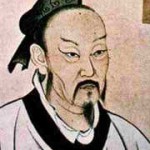 Chuang Tzu (aka Chuang Tzu, Zhuangzi, or Zhuang Zhou) was a 4th century CE Taoist philosopher although, like Lao-Tzu, the question of whether or not this person actually existed.
Chuang Tzu (aka Chuang Tzu, Zhuangzi, or Zhuang Zhou) was a 4th century CE Taoist philosopher although, like Lao-Tzu, the question of whether or not this person actually existed.
That notwithstanding, his major work (called the Zhuangzi/ Chuang Tzu, named after him) is one of foundational writings in skepticism and relativism, predating the Western skepticism movement by nearly two thousand years!
One of the most famous skeptical statements that he is known for is referred to as the Butterfly Dream – which many students of philosophy may recognize, and most Western philosophers would attribute this to Rene Descartes.
“Once Zhuangzi dreamt he was a butterfly, a butterfly flitting and fluttering around, happy with himself and doing as he pleased. He didn’t know he was Zhuangzi. Suddenly he woke up and there he was, solid and unmistakable Zhuangzi. But he didn’t know if he was Zhuangzi who had dreamt he was a butterfly, or a butterfly dreaming he was Zhuangzi. Between Zhuangzi and a butterfly there must be some distinction! This is called the Transformation of Things.” (2, tr. Burton Watson 1968:49)
“Rene Descartes –
– I know not if I was then a man dreaming I was a butterfly, or if I am now a butterfly dreaming I am a man.”
You can see the similarities…
The Taoist views of relativism and the limitations of language are rife throughout Zhuangzi’s philosophy, and can be seen in the development of Chan Buddhism – Recognizing that a word will always fall short to what the thing actually “is”.
A comprehensive understanding of what something truly “is” is only a only a placeholder of layers of conceptual assumptions, and Chuang Tzu’s relativist views really informed the budding Chan Buddhism in this light.


2 pings
[…] Chuang Tzu […]
[…] Chuang Tzu […]